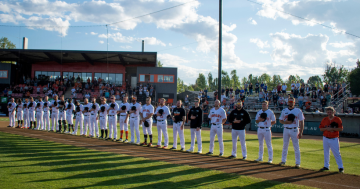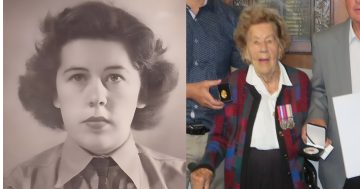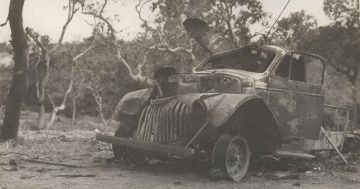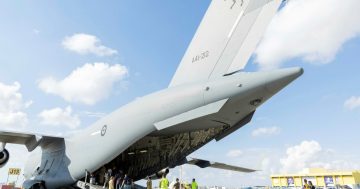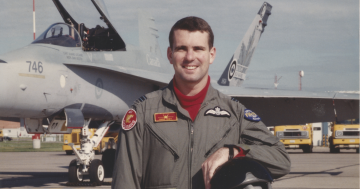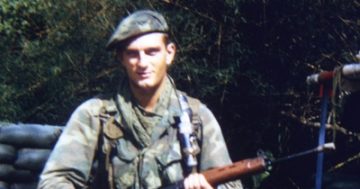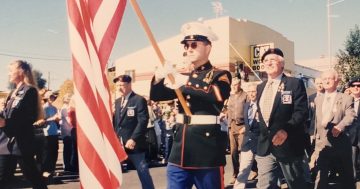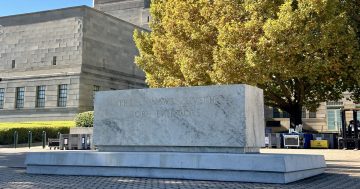
Lance Cooke, 96, holds his life membership to the Returned & Services League at his home in Gunning. Photo: Hannah Sparks.
The land was all Lance Cooke, from Goulburn, in southern NSW, knew until he joined the Royal Australian Air Force (RAAF) on his 18th birthday in January 1943.
He had ploughed paddocks and made hay for local farmers since leaving school at age 15. However, soon he would be responsible for servicing the planes that sent Australian pilots above the clouds to fight the enemy during World War II.
Mr Cooke joined the war effort not because he had to, but because he wanted to.
“I was interested and at that time I never thought about doing anything else,” he says. “The Japanese were knocking on the door, asking if they could come in.”
So the 18-year-old left his parents in Goulburn to carry out his aircraft mechanic training in Melbourne before working at the flying training schools in Tamworth, Parkes and Point Cook.
“I was lucky I joined the Air Training Corps [which provided pre-entry training for air and ground crews to the RAAF during WWII] because it opened the door to the RAAF,” says Mr Cooke. “Otherwise, I would have been in the militia.”
In 1945, aged 20, Mr Cooke was posted to Borneo. He would be responsible for servicing Beaufighter aeroplanes, described by the Japanese as “whispering death” because no-one could hear them coming.
“Things weren’t looking too good,” he says. “Darwin had been bombed and submarines had been in Sydney Harbour. It wasn’t all beer and skittles.
“We formed up in Kingaroy, Queensland, and went overseas.”
Wartime isn’t easy for any veteran to recall, particularly at the age of 96. So Mr Cooke’s mind quickly turns to Japan’s surrender on August 15, 1945 – four months after he arrived in Borneo.
He remembers planes dropping leaflets – called ‘confetti raids’ – to let people in inaccessible towns in the Pacific know the war was over.
While planes couldn’t take passengers during the war, about two to three days after Japan surrendered, Mr Cooke was authorised to join a Beaufighter Green Ghost due to drop leaflets in Kuching, Borneo.
However, his dream of flying in one of the planes he’d worked on for three years became a near-death experience.
Usually, Mr Cooke would have serviced the plane himself the day before it was due to take flight. However, he was called to tea in the officer’s mess.
“They told me they had another mechanic working on the plane,” he says.
Everything should have been fine, however Mr Cooke noticed an oil leak in the engine during the flight.
“I let the pilot know and 10 minutes later they realised oil was dripping off the tail,” he says. “We realised then there was a slight problem.”
The pilot quickly changed course so they could land nearby, but the engine cut out before they landed.
“I’ve never seen a bloke sweat like Ray [the pilot] did,” says Mr Cooke. “His shirt was soaked in two to three minutes.”
The pilot, who had flown these planes throughout the war, skilfully managed to get the aircraft – which was by then tilting to one side – back on track and he landed without any injuries.
However, it was a stark reminder of how quickly things can go wrong mid-air and how important Mr Cooke’s role was during the war. Without his attention to detail, he and the crew would have died during that flight.
“Plane crashes were common,” he says. “You never knew when somebody went out if they’d come back or not.”
Soon after, Mr Cooke received a letter from his father to say he was dying of bowel cancer – a secret he’d kept during the war.
Mr Cooke returned to Goulburn to say goodbye and soon met his wife, June.
In the following years, they had a son and daughter, and farmed a soldier settlement block near Gunning, a 30-minute drive south of Goulburn.
Some years later, the couple bought a block close to Gunning Showground and grew a vegetable garden. They became known as the ‘radish kings’, selling radishes in Canberra to every market stall in Fyshwick, and all but two in Belconnen.
“I came out of the air force and went back to where I left off,” says Mr Cooke. “It was as if it was just a holiday.”
He stayed in touch with the friends he’d made during the war through an annual reunion in Sydney, but says the group grew smaller and smaller each year.
He took part in a special service at the Australian War Memorial for the 75th anniversary of the end of WWII but says he doesn’t feel up to commemorating this year’s Anzac Day due to health problems.
Original Article published by Hannah Sparks on About Regional.











